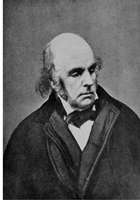On Anne Allen Poem by Edward Fitzgerald
On Anne Allen
The wind blew keenly from the Western sea,
And drove the dead leaves slanting from the tree--
Vanity of vanities, the Preacher saith--
Heaping them up before her Father's door
When I saw her whom I shall see no more--
We cannot bribe thee, Death.
She went abroad the falling leaves among,
She saw the merry season fade, and sung--
Vanity of vanities the Preacher saith--
Freely she wandered in the leafless wood,
And said that all was fresh, and fair, and good--
She knew thee not, O Death.
She bound her shining hair across her brow,
She went into the garden fading now;
Vanity of vanities the Preacher saith--
And if one sighed to think that it was sere,
She smiled to think that it would bloom next year!
She feared thee not, O Death.
Blooming she came back to the cheerful room
With all the fairer flowers yet in bloom--
Vanity of vanities the Preacher saith--
A fragrant knot for each of us she tied,
And placed the fairest at her Father's side--
She cannot charm thee, Death.
Her pleasant smile spread sunshine upon all;
We heard her sweet clear laughter in the Hall--
Vanity of vanities the Preacher saith--
We heard her sometimes after evening prayer,
As she went singing softly up the stair--
No voice can charm thee, Death.
Where is the pleasant smile, the laughter kind,
That made sweet music of the winter wind?
Vanity of vanities the Preacher saith--
Idly they gaze upon her empty place,
Her kiss hath faded from her Father's face--
She is with thee, O Death.
A great poem on death and every line is so encheering.
I agree with Frank - or - one of the Franks below.... Form always, always, always robs content. Diving into form poetry is a balance between the two. I don't know if anyone else noticed the odd jumps in the above poem due to Fitzgerald's intention to stay in form. On the other hand free-form poetry can be even more difficult - needing to utilize many methods to charm the reader...All of which makes poetry an art - unlike emulating a stoic geometric world - as a computer emulates a chess player. Poetry always has been an always will be art - in all form - and the odd jumps above are simply Fitzgerald's brush strokes...
I liked the poem. I gave it a high rating. A good many of my favorite poems are regular in one way or another, like this one though not quite so strained. But I would never encourage young poets to begin by imitating someone like Fitzgerald, or poems like this one. Not to begin with, at least. For efforts to achieve those regularities often miss the mark, and when they do, the effect is disharmony and artificiality. I grew up on poems of regular rhythmic, metrical, stanzaic, and rhyming patterns. I try to like them still. I praise them often. But almost always they strike a note that rattles me. A poem of this seriousness somehow seems dispassionate when so much attention has obviously been lavished on rhythm, meter, stanza form, and especially rhyme - matters of mere form, not substance or deep passion. The human voice is slighted. Labored rhymes, especially, croak, like a frog in the pantry: falling leaves among / season fade and sung; laughter kind / winter wind. We do not go the falling leaves among; we may smile a pleasant smile, but we do not laugh the laughter kind. |
I grew up on poems of regular rhythmic, metrical, stanzaic, and rhyming patterns. I try to like them still. I praise them often. But almost always they strike a note that rattles me. A poem of this seriousness somehow seems dispassionate when so much attention has obviously been lavished on rhythm, meter, stanza form, and especially rhyme - matters of mere form, not substance or deep passion. The human voice is slighted. Labored rhymes, especially, croak, like a frog in the pantry: falling leaves among / season fade and sung; laughter kind / winter wind. Oh, don't misunderstand. I liked the poem. I gave it a high rating. A good many of my favorite poems are regular in one way or another, though not quite so strained. But I would never encourage young poets to begin by imitating someone like Fitzgerald, or poems like this one. Not to begin with. For efforts to achieve those regularities often miss the mark, and when they do, the effect is disharmony and artificiality. We do not go the falling leaves among; we may smile a pleasant smile, but we do not laugh the laughter kind.
This poem has not been translated into any other language yet.
I would like to translate this poem
No voice can charm thee, death. A glowing tribute to death itself.